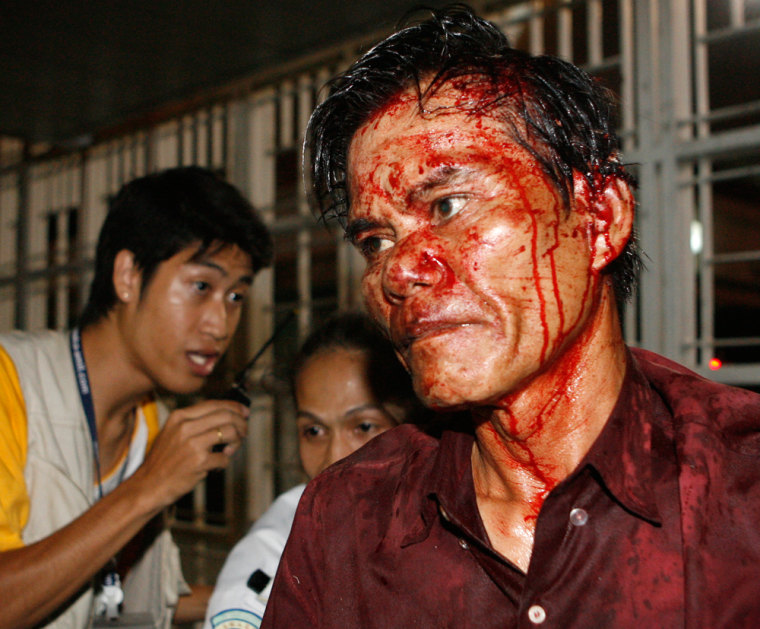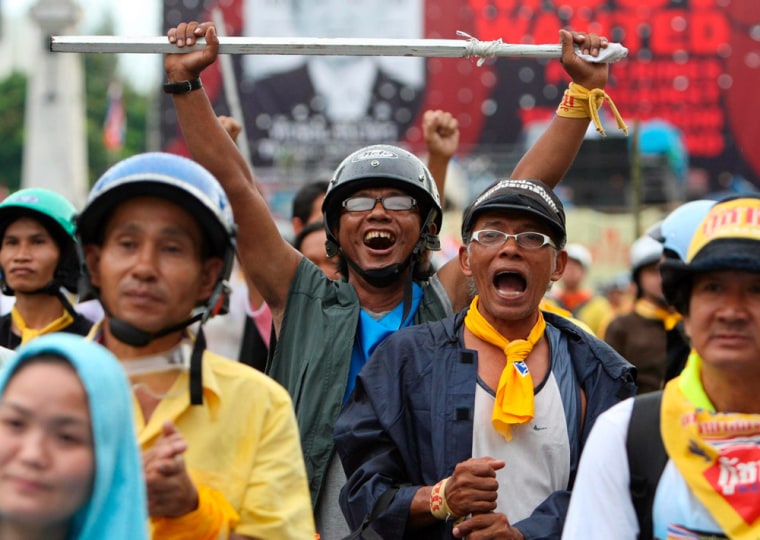Thailand's prime minister declared a state of emergency in the capital Bangkok Tuesday after a week of political tension exploded into violent street clashes between supporters and opponents of the government that left one person dead.
Under sweeping powers that give the military the right to restore order, authorities can suspend certain civil liberties, ban all public gatherings of more than five people and bar the media from reporting news that "causes panic."
The military said the army did not want to step into the crisis but if it had to, it would not use force against the public.
Prime Minister Samak Sundaravej was confronted with another threat Tuesday when the Election Commission recommended his People's Power Party be disbanded for electoral fraud during December elections. Samak and other top party leaders would be banned from politics for five years if the ruling is upheld by judicial authorities.
'Softest means available'
Samak gave no timeframe for how long the emergency decree would stay in effect but said it would be over "moderately quickly."
"I did it to solve the problems of the country," Samak said in a televised news conference at a military headquarters in Bangkok. "I had no other choice. The softest means available was an emergency decree to end the situation using the law."
The overnight violence heightened a national crisis that started a week ago when thousands of opponents of Samak occupied the grounds of his office and refused to move until he resigned.
The right-wing People's Alliance for Democracy accuses Samak's administration of corruption and says the prime minister is too close to ex-Prime Minister Thaksin Shinawatra, who was ousted in a 2006 coup and recently fled to Britain to escape an array of corruption charges. The same group organized the massive anti-Thaksin demonstrations in 2006 that helped spark the bloodless coup.
The alliance and their sympathizers — monarchists, the military and the urban elite — complain that Western-style democracy with one-man, one-vote gives too much weight to Thailand's rural majority, who protesters say are susceptible to vote buying that breeds corruption. They have proposed a system under which most lawmakers would be appointed rather than elected.
The prime minister has repeatedly insisted he will not bow to pressure by resigning or dissolving parliament to call new elections.
Armed gangs
Samak declared the state of emergency after a week of protests turned violent overnight.
About 500 Samak supporters marched through the streets of Bangkok after midnight vowing to retake the prime minister's office from anti-government protesters who have occupied it for the past week. Gangs armed with sticks, knives, slingshots and other makeshift weapons chased each other up and down boulevards, beating anyone they could catch. Reporters saw at least one man aiming and firing a pistol into a crowd.
The government supporters scuffled with police near the prime minister's, then clashed with rival protesters. One person, identified as a 55-year-old man, died from severe head injuries and nine others were hospitalized, at least three with gunshot wounds, the Health Ministry said. Another 33 people were treated for injuries and sent home.
Calm returned to Bangkok's streets by morning after Samak deployed troops with riot gear — but no guns — to disperse the two groups of protesters. Except for the prime minister's compound where thousands of anti-government protesters were still holed up, there was no sign of tension across the city and businesses were open as usual.
The U.S. Embassy also warned its citizens of the potential for violence in Bangkok, while Singapore and South Korea urged against any travel to Thailand.
"We wish to remind American citizens that even demonstrations intended to be peaceful can turn confrontational and possibly escalate into violence," the U.S. Embassy said. "American citizens are therefore urged to avoid the areas of demonstrations if possible, and to exercise caution if within the vicinity of any demonstrations."
Despite the emergency decree, the crisis shows no sign of abating.
A labor federation for state employees said Monday 200,000 of its members will go on strike starting Wednesday to support the protesters. The strike could disrupt train, bus and air service and cut electricity and water to some government buildings, said Sawit Kaewwan, secretary-general of the State Enterprise Workers Relations Confederation which comprises 43 unions for state employees.
The army said it wanted to stay out of the conflict.
Military 'will not use force'
After a meeting of senior security officials, Army Commander Gen. Anupong Paochinda called a news conference where he repeatedly stressed that the army's goal was to avoid violence.
"If the military has to get involved, it will not use force and will be on the people's side," Anupong said, adding that troops would carry only shields and batons if ordered into the streets. "They will not be armed, they will not wear bulletproof vests."

He dismissed speculation that the army was positioning itself to seize power, less than two years after the 2006 coup.
"If the military uses force to stage a coup, it will create a lot more problems," he said, adding that it was "too soon" for authorities to exercise the emergency power of restricting media coverage.
One of the protesters at the prime minister's office, 66-year-old Kaewta Singhasaenee, said she was bracing for clashes after nightfall with pro-government forces.
"Wait until tonight," said Kaewta, clutching a bamboo rod and a helmet. "If they come, I won't run. I love my country. I'm an old lady but I'm strong."
